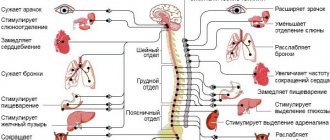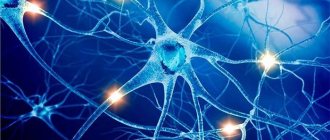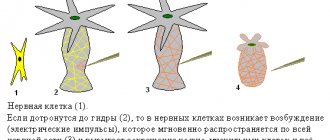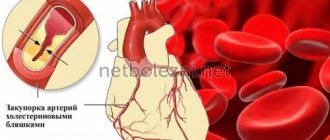A person is designed in such a way that almost every day he worries about his loved ones and worries about things that are important to him, because modern life constantly throws him into stressful situations. All this has a negative effect on the central as well as the autonomic nervous system. Moreover, such an impact does not pass without a trace. Negative emotions lead to the development of physical and mental pathologies. After all, we know that “all diseases come from nerves.”
How to maintain your health? Who should pay attention first to strengthening the nervous system? Let's try to understand this issue.
Nervous system and its strength
Which people are most susceptible to stress? Of course, those who have a weak type of nervous system. Moreover, according to experts, with each new generation the number of such people is constantly increasing.
This or that margin of safety, which distinguishes the nervous system, is given to every person from birth. This indicator indicates the performance and endurance of all nerve cells in our body. If the NS has sufficient strength, then it is able to withstand any, sometimes even the strongest, excitations. In this case, cell inhibition does not occur. Thus, the difference between people with a strong and weak nervous system is that the first of them are able to withstand extremely strong stimuli. What if the NS is weak? Then its owners cannot boast of patience. They are unable to withstand exposure to strong stimuli. They find it difficult to retain the information that comes to them. That is why people with weak nerves share it with everyone, sometimes even with the first people they meet. Indeed, in such situations, the NS begins to slow down or stops working altogether.
However, a weak nervous system also has its advantages. For example, it has increased sensitivity and is able to easily distinguish ultra-weak signals.
Weakening of the nervous system: hidden causes
Library » Psychological research » Nervous system
© Andrey Tornov
Various fluctuations in vitality, mood or mental balance occur much more often than those life events that are capable of influencing them in one way or another (in everyday life: “getting off on the wrong foot,” “everything is not a joy,” “nothing hurts, but you don’t know what to do with yourself”, “... you’ll cry near full barns, you’ll dance around dry crust”)
Explanations that justify low mood, lack of confidence in one’s strengths, or fears arise naturally in people, sounding extremely logical and convincing to them. Attempts to “remove” or change this direction of thoughts using “psychological” methods usually used in psychotherapy quite often do not lead to the desired result. The reasons for the ineffectiveness of these methods are well known to science, but the “specificity of the genre” allows psychotherapists, in most cases, to make the same mistakes.
One of the main provisions of psychotherapy is that if a person has any psychological problems, then they can only be caused by psychological reasons (stress, subconscious conflicts, etc.). This approach to the problem, however, does not take into account the inevitable and proven dependence the functioning of the brain depends on the state of the whole organism and its individual organs. The beauty and fragrance of a flower are provided by processes occurring deep in its roots. This comparison illustrates a fundamental, universal and extremely important principle: within the framework of one system, it is impossible to evaluate the work of any of its links without taking into account the interactions that exist within it. Simply put, everything is interconnected.
This rule is always and primarily taken into account, for example, by Chinese medicine (in particular, most gynecological diseases are regarded by Chinese doctors as a consequence of impaired liver function and are successfully treated only if this organ is normalized. The validity of this approach is confirmed, among other things, by the scientifically established influence of the liver on the life cycles of female sex hormones - estrogens.Chronic headache, the cause of which is hidden in impaired activity of the kidneys or gall bladder, is quite well covered in the medical literature and can also serve as a clear confirmation of this principle).
At the same time, taking into account these mutual influences is almost completely absent in the practice of domestic psychotherapy. This, in turn, inevitably leads to the fundamental unsolvability of a number of problems, as well as to the consolidation of obviously untenable views and concepts in the methodology of psychological assistance. Undoubtedly, psychotherapy has many effective means for normalizing the neuropsychic state of patients.
But, at the same time, the immutable requirement that any therapeutic method must correspond to the stage of the disease at which it can be successfully applied is almost universally violated. Figuratively speaking, psychotherapy immediately takes on the major repairs of the roof, without noticing the crumbling walls. If she notices them, then, most often, she sees the cause of this phenomenon in the incorrect or weakened design of the same roof (such views actually form the basis of the so-called “psychosomatic” school and a number of other psychocentric directions).
Indeed, obvious disruptions in nervous activity very often occur after severe or prolonged stress.
At the same time, there is always a significantly larger number of examples when stressful situations either have no consequences for people at all, or these consequences are minimal and disappear quite quickly in the post-stress period. Psychotherapy, as far as one can see, does not have convincing explanations for this state of affairs.
At the same time, they are as follows: the ability to adapt (adapt) to any biologically acceptable conditions, including stress, is one of the most important, vital properties of the body and nervous system. We can recall, for example, that any serious trouble that can initially cause even a state of shock is perceived after some time incomparably calmer, and these changes occur regardless of a person’s will - in the depths of his subconscious. But if, even before the onset of stressful events, the nervous system was already in a weakened state, then instead of adapting to stress, a rather sharp, abrupt deterioration in its condition and functions can occur, which is often observed in its most diverse manifestations. We can simplify this situation even further by imagining a wooden fence that, suppose, falls after a normal gust of wind. What caused this fall? Wind or dilapidated fence? Correct answer: both, but the main reason was the loss of strength of the wood from which the fence was made. A gust of wind only made it obvious that the boards had long since fallen into disrepair.
The psychology of a strong person is a reflection of the strength of his nervous system, while the nervous system is a biological concept.
In accordance with this, various “failures” or “breakdowns” that occur at the biological level will have their manifestation at the level of human psychology (psychophysiology studies such things). Correspondences have been established between many seemingly exclusively psychological characteristics of a person and the biological processes that caused them. For example, “lack of purposefulness” is regarded as a consequence of circulatory disorders in the frontal lobes of the brain, and “indecisiveness” is an external manifestation of the weakness of excitation processes in certain nerve centers. It is necessary to emphasize here that the strength of the mentioned “excitation process,” as well as the presence or absence of appetite, in no way depends on the conscious will of a person.
Thus, it becomes obvious that it is impossible to solve many “nervous” problems if one does not use methods aimed at normalizing the biological processes that ensure the functioning and vital activity of the brain. The only exceptions may be mild or superficial manifestations of neurotic and vegetative-vascular disorders. All other cases require medicinal effects on the brain or on those internal organs that, according to scientifically established data, can have a decisive influence on the state of the central nervous system. Moreover, this influence occurs much more often in cases of obvious or severe forms of internal diseases. Moreover, many of the diseases of the organs or their functional abnormalities may not manifest themselves as anything other than chronic fatigue, depressive mood, phobias (fears) or other neurotic disorders.
If we talk about disorders of the body, accompanied by obvious symptoms of its impaired function, then their compatibility with nervous problems speaks for itself. In particular, with regard to people with the so-called “irritable bowel syndrome,” modern publications provide statistics according to which 80% of these people have headaches, 90% have a feeling of weakness, etc. (Prof., Doctor of Medical Sciences Yu.V. Belousov, 2006). According to other sources, with irritable bowel syndrome, the lifetime prevalence of depression reaches 60-70%. Without restoring the normal state of the intestines, healing the nervous system in these cases is unlikely.
The body constantly produces substances that have completely different effects on the nervous system: some tonify, others weaken it.
For example, it is known that male sex hormones produced by the seminal glands have a pronounced stimulating, enhancing effect on the processes occurring in the brain. At the same time, these glands produce these hormones in a weak, inactive form (testosterone). And only then, in other organs of the body, testosterone transforms into its active, biologically active form (dihydrotestosterone). One of the main organs responsible for this transformation (and not only for it) is the prostate gland. But this constant re-creation of the body's powerful and natural stimulants is often disrupted in cases where it is in a state of some chronic disease. This is reflected in medical statistics, according to which from 30 to 70% of men suffering from chronic prostatitis have various neurotic disorders. (There is other evidence of how important sexual hormones are for the male body: history shows, for example, that the guards of harems - eunuchs, who had no seminal glands, were extremely weak and susceptible to various diseases. Moreover, it was practically useless to treat them .)
It is important to know that inflammation of the prostate gland, especially chronic ones, may not manifest itself for a very long time (or never) with obvious, classic signs of this disease, such as pain in the perineum or severe sexual problems. At the same time, as has already been shown, insufficient activity of the prostate gland can cause noticeable changes in the central nervous system. Therefore, without bringing this organ back to normal, the problem of reduced vitality also cannot be solved (alternative: constant use of synthetic analogues of male hormones or indefinitely long treatment with antidepressants that partially compensate for impaired brain biochemistry). Thus, the following problem emerges: if visits to a urologist occur, then, most often, only when pain, obvious sexual pathology and other manifestations of prostate disease appear. But even in this case, all the previous time (from the onset of the disease) there was an obvious or hidden suppression of the body’s energy and central nervous activity, manifested by nervousness, fatigue, and the like. Attempts to address these complaints to neurologists or psychotherapists will most likely end in recommendations to be treated with the same “nerve-strengthening” or sedatives, to which a diagnosis such as “vegetative-vascular dystonia” or “chronic fatigue syndrome” will be added.
The prostate gland and its effect on the nervous system are given here only as an example. The influence of other organs and systems of the body on the brain is also significant and undeniable.
A description of exactly how and due to what this influence occurs is given in the book “Anatomy of Vital Force. Problems and solutions." It also provides a description and justification of those methods and means, the use of which allows, in most cases, to normalize the state and activity of the nervous system, as well as significantly improve the quality of life.
See also:
- Nervous system: 10 misconceptions and myths
- Nervous system: problems you have and knowledge you don't have
© A.G. Tornov, 2009 © Published with the kind permission of the author
Signs of weak nervous system in adults
What is different about a person whom nature could not endow with a strong nervous system? First of all, he shows indifference in most matters. Such a reaction suggests that the individual perceives any blows of fate without expressing his protest. A weak type of nervous system makes a person lazy. Moreover, this can be observed not only in relation to its psychological, but also physical characteristics. This is confirmed by people living in poverty and making no attempts to improve the situation and change their position in society.
Another sign of a weak nervous system is indecisiveness. A person characterized by increased sensitivity is ready to submit to everyone. Sometimes such people are possessed to such an extent that they turn into living robots.
Considering the characteristics of a weak nervous system, it is worth noting the constant doubts of its owners. Such a person often makes excuses, thereby trying to disguise his failures. And he doubts not only himself. People with a weak nervous system are also distrusted by those who try to help them in this or that matter. This is sometimes expressed in envy of those who are more successful and better in this life.
What else refers to the characteristics of a weak nervous system? By their excitement, expressed in anxiety, such people stand out from everyone else. Such manifestations clearly indicate a significantly reduced level of nerve strength. Constant anxiety often leads a person to mental disorders and even breakdowns. After all, such people live in constant fear. Fears take away their vitality and age them prematurely. It is worth understanding that certain concerns, and sometimes even great difficulties, are possible for every person. However, people with a strong nervous system meet them on their life path quite calmly, trying to find a way out of the current situation. Excessive worrying will not help solve the problem. It only takes away your health and brings you closer to old age.
A person with a weak nervous system can also be identified by the extreme caution they show. In order to bring their own plans and ideas to life, such people always need the right moment, which they constantly wait for. This sometimes turns into a habit. As a result, overly cautious people become pessimists, as they constantly think about a possible failure that could ruin their life’s work. All this results in indigestion, nervousness, inactive blood circulation and many other diseases and negative factors.
Read reviews about the treatment of neurasthenia
“Last year my husband needed to undergo treatment. The diagnosis of neurasthenia meant little to us at the time. It was not clear whether this was serious at all and whether there was a need to panic. The doctor at our city clinic advised me to combine therapy with rest. We began to consider different options; Israel seemed to us the most acceptable in this regard. It was here that we had long wanted to visit, and besides, the reviews about the country’s most famous clinic of this profile (Renaissance RC) were extremely positive. Therapy included a variety of approaches, including massage, diet, psychotherapy, and hypnosis. The husband noted that this helped him control his own emotions and return to normal.”
Anna Ilyina, Omsk
“Not long ago I had the opportunity to encounter neurasthenia. The disease developed gradually, so I did not immediately realize that it was time to see a doctor. I believed that the deterioration was explained by the situation at work, then my sleep returned to normal, and I again postponed going to see a specialist. But the disease returned and was even more severe each time. I realized that even if we are not talking about drug addiction treatment, it is better not to joke with health. He underwent treatment at the Renaissance RC. I am completely satisfied with the quality of therapy and the attitude towards myself. I can recommend that if such problems arise, you contact the same clinic, they will certainly help you.”
Anton Antipov, Moscow
Signs of weak nervous system at an early age
What is characteristic of impressionable children? From a very early age they are distinguished by extreme sensitivity and receptivity. At the same time, a child’s weak nervous system allows him to easily notice even the most minor changes that occur in the mood of the people around him. In addition, such children hear even the faintest sounds, rustles, and see minor shades. Such a child can even notice what is inaccessible to many of those around him. This, for example, is a slight shadow of annoyance or a spark of joy on the face of the interlocutor, as well as minor changes in the person’s gait, in his costume, and movements he makes that are invisible to many.
If a child has a weak nervous system, the process of reading books and watching films is very emotional. The plot captivates these children so much that you can often see tears in their eyes. And even after reading and watching, despite the fact that the events that caused anxiety are already in the past, memories of them cause inexplicable pain in the soul of a child with a weak nervous system.
Such children also have increased nervousness and sensitivity in cases where they find themselves in an unusual and unfamiliar environment and must do or decide something on their own. And even if it’s just some trifle, the child’s tension can be seen even in his face.
Children with a weak nervous system stand out from everyone else in physical work and educational activities. It is much easier for a teacher to work with such students. He easily accustoms them to carefully perform everyday tasks, unlike children with a strong type of nervous system, especially choleric and sanguine people. Impressionable students work better under monotonous conditions. It is not difficult for such children to get used to the daily routine. The fact is that monotonous activity does not cause much excitement, which in a child with a weak nervous system is a kind of protection against excess energy and rapid fatigue. All this should be taken into account by teachers and parents of impressionable children, without burdening them, among other things, with intense and lengthy mental or physical work. After all, such tasks will be too tiring for a small person.
It should also be borne in mind that children with a weak nervous system get tired very quickly when new conditions are created. That is, their education in the first and fifth grades becomes especially difficult. They will be able to work best at home, where no one can disturb them, or sitting at a separate table in a quiet library. If a tense and noisy environment is created, students with weak nervous systems do not cope well with the task. After all, easy tasks immediately become difficult for them. When passing exams, as well as during other exciting events, such children, as a rule, are lethargic or passive, noisy or irritable. They look sick or exhausted.
Impressionable students, unlike their peers who have a strong nervous system, are often constrained in cases that require them to act according to the current situation. If a teacher asks such children an unexpected question, it is difficult for them to answer it right away. As a rule, at such moments the student looks confused and has a tense face, not knowing what to do with himself.
When taking exams, such children show excessive anxiety. This leads to loss of appetite, insomnia or nightmares. In such situations, any feasible task seems overwhelming, and an already solved problem has an incorrect answer. After successfully passing exams, sensitive children calm down and are perplexed about their past worries. But if similar circumstances arise, this will certainly happen again.
Impressionable children sometimes get offended over a trifle. They may even cry if a conversation was completed before their appearance or a joke (not at them) was not told that caused everyone to have fun.
Connection between body and mind
Every change that occurs in the human body certainly affects his health. That is why in medicine there is such a direction as psychosomatics, which establishes a connection between the mental processes occurring in the human body and its physiological state.
Any stress factor causes a protective reaction of the body, which is expressed in muscle tension. This allows a person to maintain health. After all, when the body is tense, the soul relaxes. When such situations occur infrequently, they do not have any negative consequences for the body. However, when random psychological traumas degenerate into prolonged stress, a person becomes ill. His pathology is of the psychosomatic type, which causes difficulties in making an accurate diagnosis. While doctors are looking for the origins of the disease, a person loses vigor and sleep, efficiency and energy. His ability to enjoy life disappears, and minor inconveniences gradually develop into significant problems.
Failures in the physiological processes of the body lead to pathologies in the mental sphere. A person has to live experiencing chronic fatigue, irritation, anxiety and vague restlessness. Over a short period of time, this condition develops into a neurotic disorder, significantly worsening the quality of life.
What to do if you have a weak nervous system? How to maintain health and prevent the development of many diseases? Simple methods that will be described below will help you achieve a significant effect.
How is it structured?
The brain
is
the center of the nervous system
: approximately the same as the processor in a computer.
The wires and ports of this “supercomputer” are the spinal cord and nerve fibers. They permeate all the tissues of the body like a large network. Nerves transmit electrochemical signals from different parts of the nervous system, as well as other tissues and organs. In addition to the nerve network called the peripheral nervous system, there is also the autonomic nervous system
. It regulates the functioning of internal organs, which is not consciously controlled: digestion, heartbeat, breathing, and the release of hormones.
Hardening
How to strengthen a weak nervous system? The most effective method that gives excellent results in this direction is winter swimming. It allows you not only to put your nerves in order and improve your health, but also to develop willpower.
With regular procedures, the body will gradually get used to cold water. Such persistence is very beneficial for health, but to get a positive result you will need to follow certain rules, namely:
- produce a gradual increase in the degree of cooling;
- perform procedures regularly.
Physical activity
Every living thing must move, and do it as actively as possible. This will allow the body to constantly use up the stress hormones accumulated in it.
With regular physical activity, a person's performance increases. His brain is saturated with oxygen, and his body increases its resistance to stress. In addition, physical activity is an excellent prevention of many diseases. The most useful thing when doing it is to relieve mental and nervous tension.
The best option for such activities are walks in the fresh air. After all, they are simple physical exercises with hardening and psychological relaxation. Such walks quickly strengthen the nervous system. And if you walk in the fresh air every day for at least 30 minutes, then a positive result will not take long to arrive. It will appear after a couple of weeks.
Tourism has no less effect on increasing the strength of the nervous system. Of course, it will take more time, but in this case you can get a positive result in just a few days.
Sports will also help strengthen your nerves. It is especially effective to engage in such types of exercise as:
- aerobics;
- run;
- rock climbing;
- yoga;
- fitness;
- Pilates;
- martial arts.
The most important condition for this is the regularity and quality of the classes.
What are the reasons for such a nervous system disorder?
Before treating nervous exhaustion, it is important to determine the primary causes of this disease.
Exhaustion can occur in both men and women, without age restrictions.
These include:
— Increased physical activity for several days, weeks, months; — Lack of quality sleep and proper rest at night, insomnia ; — The presence of external irritants (problems at work, in the family, financial difficulties); — The influence of physiological factors (for example, the presence of a complex disease); — Weakening of the immune system due to a previous illness or infectious lesion of the body.
Bad habits
You can restore your nerves and get a positive result only by giving up alcohol, cigarettes or psychoactive substances. The absence of bad habits in a person is the main condition for the health of the body.
For example, many people believe that alcohol is practically harmless. However, even with rare consumption of small quantities of alcoholic beverages, increased stimulation of the nervous system and disruptions in its functioning occur. Regular drinking leads to the development of various diseases. These ailments also negatively affect the nervous system.
As for smoking, it reduces a person’s attentiveness, memory and even level of intelligence. This effect occurs due to the constriction of blood vessels in the brain, which provokes oxygen starvation, as well as due to the ingestion of toxic substances that are present in cigarettes.
Even a cup of coffee has a negative effect on the nervous system. Initially, it increases the activity of the NS, and then sharply reduces it. Gradually the nervous system becomes exhausted. A similar thing happens when drinking energy drinks.
Study the cost of treatment for neurasthenia in leading clinics
Prices for a consultation with a psychotherapist in Moscow and St. Petersburg are approximately identical - from 1,500 to 4,000 rubles. They depend on the qualifications, experience and title of the doctor, the status of the clinic, etc. The number of sessions, the treatment program, and therefore the price of all procedures, as in the treatment of alcoholism, can be determined after a thorough diagnosis.
Prices in Israel are, of course, somewhat higher, which is consistent with the highest quality provided by clinics in this state. So, a consultation with a psychotherapist here costs about $200. Its cost is also related to the regalia and experience of the specialist and the reputation of the center where the patient goes.
Proper nutrition
There are a number of products that can strengthen the human psyche and nervous system. That is why to get the desired result you will need to include in the menu:
- Nuts, cottage cheese, soy, fish and chicken. They contain proteins responsible for the functioning of reflexes and the entire central nervous system.
- Fats. Their use allows you to increase efficiency, strengthen emotional health and tone the central nervous system.
- Carbohydrates. Their main source is cereals, which provide energy to the brain and help strengthen the nerves.
- Vitamins of group B (1,6 and 12), as well as A, C, D and E. Fish and nuts, vegetables and fruits, bran, eggs and oatmeal can saturate the body with them.
- Minerals (magnesium, iron, calcium, zinc). Their presence in the body promotes the production of substances that promote the functioning and strengthening of the central nervous system. The greatest amount of minerals contains chicory and chocolate, milk and cereals, nuts, vegetables and fish.
Daily regime
Healthy and deep sleep can give the nervous system more strength. During rest, the body is restored and cells are renewed.
But early waking up, frequent awakenings, shallow sleep and lack of sleep weaken the nerves. In the absence of normal rest, a person becomes apathetic and lethargic, he has difficulty concentrating and has trouble thinking clearly. Lack of sleep often manifests itself in communication in the form of outbursts of aggression and irritation.
How to determine such a condition
Symptoms of nervous system exhaustion are quite easy to detect at any stage. Characteristic is a decrease in energy reserves, as a result of which a person feels tired even after a short rest. Additional signs of nervous exhaustion: poor quality of sleep, headaches, body aches, increased body temperature or blood pressure, increased irritability, aggressiveness, sensitivity to external factors.
Disruption of the nervous system is typical for people who work in a busy schedule, on a rotational basis, or among managers of large companies (under the influence of constant responsibility and stress). Young mothers and people with diseases of the immune system are also susceptible to the influence of external irritants.









